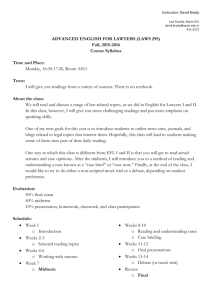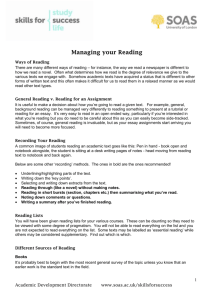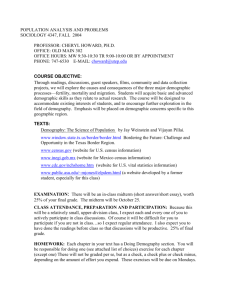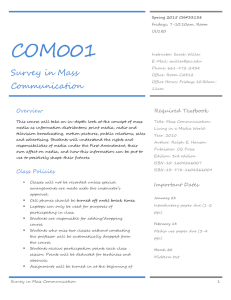Urbanization in 19th and 20th Century Europe
advertisement
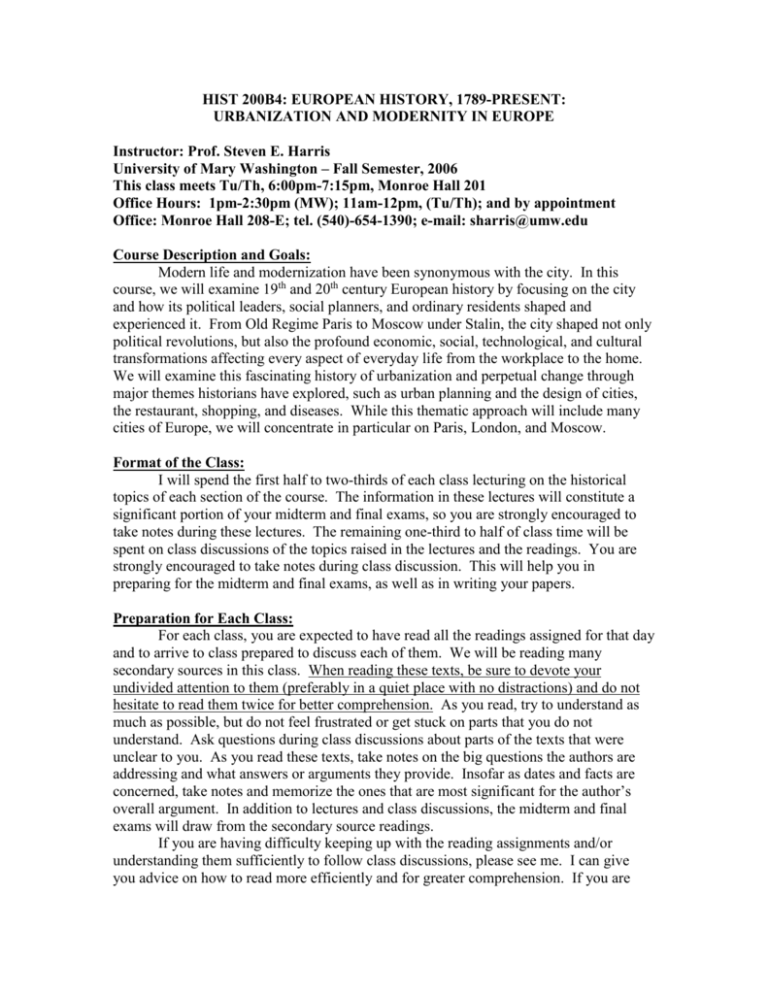
HIST 200B4: EUROPEAN HISTORY, 1789-PRESENT: URBANIZATION AND MODERNITY IN EUROPE Instructor: Prof. Steven E. Harris University of Mary Washington – Fall Semester, 2006 This class meets Tu/Th, 6:00pm-7:15pm, Monroe Hall 201 Office Hours: 1pm-2:30pm (MW); 11am-12pm, (Tu/Th); and by appointment Office: Monroe Hall 208-E; tel. (540)-654-1390; e-mail: sharris@umw.edu Course Description and Goals: Modern life and modernization have been synonymous with the city. In this course, we will examine 19th and 20th century European history by focusing on the city and how its political leaders, social planners, and ordinary residents shaped and experienced it. From Old Regime Paris to Moscow under Stalin, the city shaped not only political revolutions, but also the profound economic, social, technological, and cultural transformations affecting every aspect of everyday life from the workplace to the home. We will examine this fascinating history of urbanization and perpetual change through major themes historians have explored, such as urban planning and the design of cities, the restaurant, shopping, and diseases. While this thematic approach will include many cities of Europe, we will concentrate in particular on Paris, London, and Moscow. Format of the Class: I will spend the first half to two-thirds of each class lecturing on the historical topics of each section of the course. The information in these lectures will constitute a significant portion of your midterm and final exams, so you are strongly encouraged to take notes during these lectures. The remaining one-third to half of class time will be spent on class discussions of the topics raised in the lectures and the readings. You are strongly encouraged to take notes during class discussion. This will help you in preparing for the midterm and final exams, as well as in writing your papers. Preparation for Each Class: For each class, you are expected to have read all the readings assigned for that day and to arrive to class prepared to discuss each of them. We will be reading many secondary sources in this class. When reading these texts, be sure to devote your undivided attention to them (preferably in a quiet place with no distractions) and do not hesitate to read them twice for better comprehension. As you read, try to understand as much as possible, but do not feel frustrated or get stuck on parts that you do not understand. Ask questions during class discussions about parts of the texts that were unclear to you. As you read these texts, take notes on the big questions the authors are addressing and what answers or arguments they provide. Insofar as dates and facts are concerned, take notes and memorize the ones that are most significant for the author’s overall argument. In addition to lectures and class discussions, the midterm and final exams will draw from the secondary source readings. If you are having difficulty keeping up with the reading assignments and/or understanding them sufficiently to follow class discussions, please see me. I can give you advice on how to read more efficiently and for greater comprehension. If you are 2 having difficulty with the reading assignments, I can work with you best if a) you make an honest effort to read the materials thoroughly on your own, and then b) you see me to discuss reading assignments and general methods for reading texts. Recognizing that the readings are difficult is the starting point in learning how to read secondary texts and understand them, not the ending point. Course Assignments and Requirements: 1) Class participation: the quality of this class depends largely upon what each student will contribute to it, so your class participation is of paramount importance as we analyze and interpret the texts in this course. You are asked to engage one another’s interpretations and opinions in an effort to understand better any given text and also to challenge one another’s readings of the texts. You are expected to participate at least once a week. I will assign a numerical participation grade for each student on the Thursday of each week in the semester beginning with week two. If you do not participate on Tuesday, therefore, you want to be sure to say something in class on Thursday otherwise you will receive a C (75%) for participation for that week. Failure to show up to class makes it impossible for you to participate in any way; therefore, unexcused absences (see below) on either Tuesday or Thursday of any week results in a 0% participation grade for the week. At the end of the semester, I will drop your lowest weekly participation grade from your final participation grade. The following is the guideline for participation grades: A range (90-100%): student shows that he/she has read all of the assigned readings, and he/she makes several comments and poses questions that are insightful, interesting, and help guide the discussion for that particular class; B range (80-89%): student shows that he/she has read most of the readings and makes some comments/questions; C range (70-79%): student may have read some of the readings, but makes little or no comments; D range (60-69%): student is disruptive in class; 0%: unexcused absence. 2) Short response paper: You will write a brief 2-3 page paper based on one of the first two readings in response to a choice of questions I will provide to the class. 3) Midterm exam: your midterm exam will cover lectures, class discussions, and all the readings to date. The format of the exam will be as follows: 1) 3 out of 5 identifications; 2) 1 explanation and critique of 1 historian’s argument; 3) essay in response to 1 out of 3 questions. 4) Paper: You will write a 12-14 page research paper on a topic of your choosing in consultation with me. Please see me during the first three weeks of the semester to discuss and choose your paper topics. 5) Class presentation: You will present your paper topic, research, and arguments before the class in a 10-15 minute presentation. The schedule for class presentations will be drawn up during the fourth week of classes. 6) Final exam: the final exam will be cumulative and will cover all lectures, class discussions, and readings in the course. The format will be as follows: 1) 5 out of 7 identifications; 2) 2 explanations and critiques of 2 historians’ arguments; 3) 1 essay in response to 1 out of 3 questions. 7) Extra credit: field trip to Washington, DC, on December 2. We will take a trip to explore this modern city of the United States in an effort to understand its place in the 3 history of the modern city. Students who participate on this field trip and wish to earn extra credit must write a 2-3 page paper about their trip. The extra credit assignment will be graded and will replace your lowest weekly participation grade. Students may also participate on this field trip and not write a paper, but without extra credit. If you cannot participate on the field trip, but wish to complete the extra credit assignment, you may write a brief 2-3 page paper on a topic of your choosing in consultation with me. Numerical grades in this course correspond to the following letter grades: A (95100); A- (90-94); B+ (87-89); B (83-86); B- (80-82); C+ (77-79); C (73-76); C- (70-72); D+ (67-69); D (60-66); F (59 and below). Midterm Deficiency Report: You will receive a midterm deficiency report if you receive a C- or below on your response paper and/or the midterm exam. Relative Weight of Grades for the Course: Class participation: Response paper: Midterm exam: Term paper and class presentation: Final exam: 15% 10% 20% 25% 30% Legitimate Excuses for Missing Class and Turning Work in Late: Legitimate excuses include family emergencies, medical appointments, illness, and religious holidays. All excuses must be supported with documentary proof, such as a note from a doctor, with the contact information of the person writing the excuse. Notes from relatives will not be accepted. In the event of a family emergency, such as a death in the family, please contact the Office of Academic Affairs and ask them to contact me about the emergency. If you miss class or fail to turn something in on time and you have a legitimate excuse, please do the following: obtain the documentary proof explaining your absence or the reasons for which you turned something in late; bring it to me in class or during office hours; stop by during office hours to discuss what you missed in class. If you miss class or fail to turn something in on time without a legitimate excuse, do not e-mail me to tell me this and do not ask me to explain to you over e-mail what you missed in class; I will not respond to such e-mails. For every day after a deadline that you turn work in late without a legitimate excuse, your grade on the assignment is dropped by a third of a letter grade until you reach F, in which case you will receive a 0% on the assignment. Failure to show up to take the midterm exam or the final exam without an excused absence results in an automatic 0% for that exam. Communication: Please use e-mail to communicate with me about minor questions and administrative questions. Please use formal forms of address, salutations, and good-byes, as well as proper grammar, spelling, and punctuation when writing e-mails to me. If you wish to discuss readings and course topics, specific questions about your writing 4 assignments, your grades, etc., please avoid e-mail for these questions; instead, stop by during office hours or make an appointment to see me. Honor Code: The Honor Code of the University of Mary Washington will be strictly enforced, as explained in the Honor Constitution. If you have any questions about the code and its enforcement, please do not hesitate to ask me. All violations of the Honor Code will be immediately reported to the Honor Council. In writing your papers, be sure to avoid plagiarism. If you take someone else’s ideas or words and present them in an essay as your own (i.e., without proper acknowledgement of the author), you will have committed plagiarism. If you are unsure about what this means, please do not hesitate to ask me for further clarification. Americans with Disabilities Act: If you have a disability and require academic accommodation, please contact the Office of Disability Services (x1266). Upon obtaining an accommodation letter from this office, please see me so that we can establish the proper academic accommodation for you in this course. All information pertaining to your academic accommodation will be kept in the strictest confidence. Drop/Add: Last day to add this class: September 1; last day to drop this class: September 15. Additional Class Policies: * All cell phones must be turned completely off during class. * Use of laptop computers, recording machines, and other electronic equipment is not allowed in this class. * Arrive to class on time. You must attend the entire class time in order to receive credit for participation for that day. Course readings: The following texts are available for purchase at the bookstore. When purchasing the texts, please obtain the edition indicated below – this will facilitate class discussion when the instructor and students refer to the texts. Peter Baldwin, Contagion and the State in Europe, 1830-1930 (Cambridge: Cambridge University Press, 1999). ISBN 052161628X Timothy J. Colton, Moscow: Governing the Socialist Metropolis (Cambridge, Mass.: The Belknap Press of Harvard University Press, 1995). ISBN 0-674-58749-9 Patrice Higonnet, Paris: Capital of the World, trans. Arthur Goldhammer (Cambridge, Mass.: Harvard University Press, 2002). ISBN 0-674-01758-7 Erika Diane Rappaport, Shopping for Pleasure: Women in the Making of London’s West End (Princeton: Princeton University Press, 2000). ISBN 0-691-04476-7 Wolfgang Schivelbusch, The Railway Journey: The Industrialization of Time and Space in the 19th Century (Berkeley: The University of California Press, 1986). ISBN 0-520-05929-8 5 Rebecca L. Spang, The Invention of the Restaurant: Paris and Modern Gastronomic Culture (Cambridge, Mass.: Harvard University Press, 2000). ISBN 0-67400685-2 Course Schedule August 29: Introduction: What is the modern city? Paris: The City of Modern Europe August 31: Higonnet, 1-74. September 5: Higonnet, 121-204; 230-261. September 7: Higonnet, 317-373; 434-436. The Restaurant: Eating in the City September 12: Spang, 1-87. September 14: Spang, 88-118. September 19: Spang, 119-169. September 20: Response Paper Deadline (5pm) September 21: Spang, 170-206. September 26: Spang, 207-245; Higonnet, 288-316. September 28: Midterm Exam Transportation and the Modernization of Movement in Urban Spaces October 3: Schivelbusch, 1-88. October 5: Schivelbusch, 89-128. October 10: Schivelbusch, 129-170. October 12: Schivelbusch, 171-197. 6 Flâneurs and Consumers: Shopping, Leisure, and Recreation in the City October 19: Rappaport, 3-73; Higonnet, 95-120. October 24: Rappaport, 74-141. October 26: Rappaport, 142-177. October 31: Rappaport, 178-222. Public Health, Disease, and Death in the City November 2: Baldwin, 1-36. November 7: Baldwin, 37-123. November 9: Baldwin, 355-400. November 14: Baldwin, 400-523. November 15: Term Paper Deadline (5pm) November 16: Baldwin, 524-563; Colton, 1-11. The Socialist City November 21: Colton, 71-151. November 23: Thanksgiving November 28: Colton, 204-280. November 30: Colton, 325-381. December 2: Field trip to Washington, DC December 5: Colton, 397-518; Film screening (in class): Man with a Movie Camera (Dziga Vertov, 1929) December 7: Colton, 518-566. Final Grade: December 12, 7pm-9:30pm
